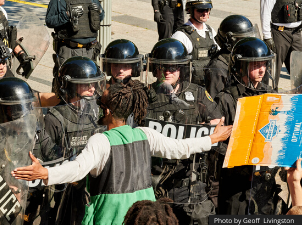
We Call for Justice in Policing
Necessary Standards and Accountability
Tralonne Shorter
June 11, 2020
Our nation is at a pivotal moment to redress systemic racism and the various ways it manifests as state-sanctioned violence, over-criminalization, and policing of Black people and communities. On Monday June 8, 2020, House and Senate Democrats unveiled a new policing reform bill in the wake of George Floyd’s murder in Minneapolis. The bill, the Justice in Policing Act, now has over 220 cosponsors.
NETWORK joins advocacy partners, including the Leadership Conference on Civil and Human Rights, in encouraging all Members of Congress to support this legislation that would lay the groundwork for criminal justice reform by setting a standard for policing and safety and hold officers accountable for misconduct and excessive use of force. NETWORK sent the following letter to all Members of Congress in support of this critical legislation, as well as the accompanying leave behind document.
Download the letter as a PDF.
Download the Justice in Policing Act leave behind.
Read the letter:
June 11, 2020
Dear Members of Congress,
NETWORK Lobby for Catholic Social Justice is pleased to express strong support for the Justice in Policing Act of 2020 (H.R. 7120) introduced by Congressional Black Caucus Chairwoman Karen Bass, House Judiciary Chairman Jerry Nadler, Senator Cory Booker, and Senator Kamala Harris. We applaud our elected representatives for taking quick, bold action in response to the abhorrent and pernicious use of police force against Black adults and children. Now is the time for Congress to act and take a firm stance against the systemic racism embedded in police departments across the nation and within the criminal justice system. We implore you to pass this bill to honor George Floyd, Breonna Taylor, Eric Garner, Tony McDade, Tamir Rice, and the countless Black lives lost at the hands of police violence and in the name of keeping communities safe.
The Justice in Policing Act takes a monumental step toward dismantling the chokehold of white supremacy in policing by ending long-held practices that allow law enforcement officers to murder or maim Black people with impunity. These egregious acts of state-sanctioned violence terrorize Black communities across the nation, sowing deeper mistrust, and assailing communities that need investments in meaningful social and economic reform, not more dollars in militarizing the police force. For the United States to be great, we must root out all patterns and practices that destroy Black lives. This moment in history lays bare the reality that Black communities are traditionally under-resourced in education, health, housing, political representation, banking, and other federal and state programs that are necessary for people to thrive.
The Justice in Policing Act opens a route to reestablish trust in law enforcement and facilitate greater police accountability. This will enable the police to faithfully protect the communities they are meant to serve. The bill would ban chokeholds and support implicit bias training and community policing. As the House prepares to debate this bill, and negotiations with the Senate ensue, we urge you to include and adhere to the following principles in any legislation addressing police brutality and accountability:
-
- Require a federal standard that use of force be reserved for only when necessary as a last resort after exhausting reasonable options, and incentivize states to implement this standard; require the use of de-escalation techniques, and the duty to intervene; ban the use of force as a punitive measure or means of retaliation against individuals who only verbally confront officers, or against individuals who pose a danger only to themselves; and require all officers to accurately report all uses of force;
- Prohibit all maneuvers that restrict the flow of blood or oxygen to the brain, including neck holds, chokeholds, and similar excessive force, deeming the use of such force a federal civil rights violation;
- Prohibit racial profiling, and require robust data collection on police-community encounters and law enforcement activities. Data should capture all demographic categories and be disaggregated;
- Eliminate federal programs that provide military equipment to law enforcement;
- Prohibit the use of no-knock warrants, especially for drug searches;
- Change the 18 U.S.C. Sec. 242 mens rea requirement from willfulness to recklessness, permitting prosecutors to successfully hold law enforcement accountable for the deprivation of civil rights and civil liberties;
- Develop a national public database that would cover all police agencies in the United States and its territories, similar to the International Association of Directors of Law Enforcement Standards and Training’s National Decertification Index,11 which would compile the names of officers who have had their licenses revoked due to misconduct, including but not limited to domestic violence, sexual violence, assault and harassment, criminal offense against minors, excessive use of force, violation of 18 U.S.C. § 242; perjury, falsifying a police report or planting and destroying evidence, and deadly physical assault; as well as terminations and complaints against the officers; and
- End the qualified immunity doctrine that prevents police from being held legally accountable when they break the law. To overcome the defense of qualified immunity, require that a victim must show that law enforcement violated “clearly established” law by pointing to a case arising in the same context and involving the same conduct.
A new day has dawned across the globe as millions march in protest, amid a pandemic, for an end to police assault of Black people and families. The time is long overdue for enacting policing reforms that hold law enforcement accountable and equally responsible for protecting and serving everyone in society. Failure to act now would be an abdication of your moral and civic duty and a blatant disregard for the humanity of Black lives.
Sincerely,
Sr. Simone Campbell, SSS
Executive Director
NETWORK Lobby for Catholic Social Justice







